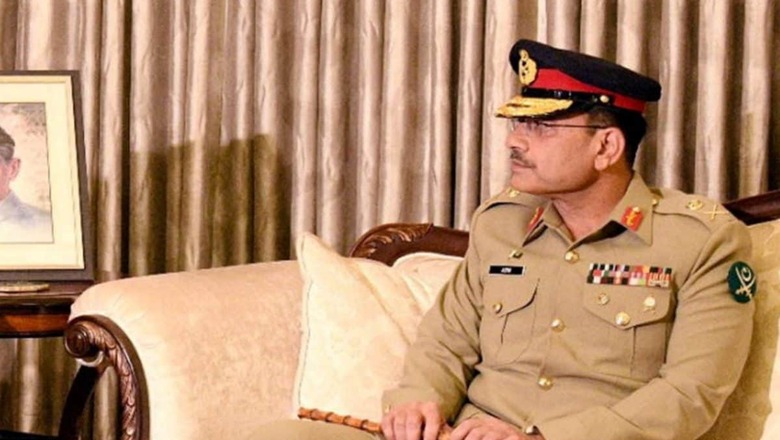
views
This writer had noted on June 13, in these columns, that Pakistan’s “Army chief General Asim Munir is in full control of his institution.” If anyone had any doubt about this, it should have been settled by Director General of Inter-Services Public Relations (ISPR) Maj Gen Ahmed Sharif’s almost one-and-a-half-hour press conference on June 26. Sharif revealed that the Army chief had acted against officers on the basis of the findings of two enquiries held under the forces’ rules. These enquiries, chaired by Major Generals, and conducted in conformity with army traditions, had examined charges of dereliction of duty in protecting army installations and monuments dedicated to the memory of martyrs from mob attacks on May 9. On that ‘black day’, former Prime Minister Imran Khan and head of the Pakistan Tehreek-e-Insaaf (PTI) was arrested and almost countrywide protests had broken out.
After getting the enquiry reports, Sharif said that the Army chief had followed the principle “higher the rank, higher the responsibility.” On this basis, three officers, including a three-star general, were removed from service. Besides these dismissals, severe disciplinary action has been taken against 15 officers, including three Major Generals and seven Brigadiers. The dismissed and disciplined officers, whose names Sharif refused to reveal, were found wanting in discharging their responsibilities in defending army installations from mob attacks. The dismissed three-star general is no doubt Salman Fayyaz Ghani who was the Lahore-based IV Corps Commander who allowed his residence, which was once owned by Mohammad Ali Jinnah, to be looted by protestors without offering any resistance.
Ahmed also said that the protestors’ attacks on army installations in Rawalpindi, Lahore, Karachi, Chakdara, Timirgera, Multan, Peshawar, Mardan, Quetta, Sargodha, Mianwali and other places were the result of a conspiracy. He went on to say that for over a year, anti-army and anti-army leadership sentiments were being instilled among the people. He asserted that the planners, facilitators and perpetrators of attacks against army installations would not be spared. This was irrespective of their party affiliations or social and economic standing. Thus, the maternal granddaughter of a retired four-star general, the son-in-law, also of a retired four-star general, the wife of a retired three-star general and the wife and son-in-law of a retired two-star general are under investigation. In a clear message to the judiciary, Ahmed said that military courts were held constitutionally valid in the past and such courts had also passed the scrutiny of the International Court of Justice (ICJ). Clearly, this comment was made in the context of the Pakistan Supreme Court hearing of a petition against the trial of civilian protestors in military courts.
In his writings, on the events of May 9, this writer has noted that Army chief Asim Munir cleverly used the attacks by Imran Khan’s supporters on army installations to diminish popular support for the PTI chief. This is especially borne out by the Army’s constant focus on the damage done to the memorials dedicated to Pakistan’s venerated martyrs. The fact that the protests were so widespread and that no Army officer took on the protestors shows that general orders would have been issued for the Army to show restraint. Obviously, these were interpreted by the commanding officers of the places named by DG ISPR that in no event were they to take action that would result in injuring or killing protestors. This stated, the basic question is why did these officers not strengthen guards to prevent mobs from entering army installations? It is passing strange that not one commanding officer decided to effectively protect installations under his jurisdiction.
The full drama which was being played out in Army headquarters in Rawalpindi and different Corps headquarters on May 9 will only be known subsequently. It will certainly leak out in dibs and drabs for the dismissed and disciplined officers and their families and friends will not keep quiet in the months and years to come. For the time being, however, it can be said that Munir has taken full advantage of the May 9 events to consolidate his position in the Army and society, flush out officers who may not be fully committed to him, greatly damage Imran Khan’s popularity and become, as all Pakistan Army chiefs become, the final arbiter of their country’s affairs.
Now that Munir has achieved this, what does the future hold for Pakistan?
A few assessments can be straightaway made:
- Munir and the Army are not interested in staging a coup, suspending the Constitution, and taking over direct power. That contingency can only arise if there is a complete breakdown of law and order and a full economic collapse. Neither is on the horizon.
- The International Monetary Fund’s (IMF) current programme of support — the 23rd in Pakistan’s history — is due to expire on June 30. The IMF has taken an unprecedentedly tough stand since last October seeking the fulfilment of Pakistani commitments before it releases its next tranche of US $1.2 billion of the total remaining amount of US $2.6 billion of the pledged support amount of US $6.5 billion. Pakistan claims that it has met all its conditions, including modifying its budget for the financial year which begins on July 1. Prime Minister Shehbaz Sharif has been in contact with IMF Chief Kristalina Georgieva to ensure that at least a tranche of US $1.2 billion is released before the programme expires. IMF representatives have made positive noises. It would seem that the IMF board would agree to the release of US $1.2 billion which would be a signal to international investors that Pakistan has taken steps to stabilise its macro-economic situation, at least in the short run. That would lead to other donors either rolling over Pakistani debt or extending help to meet commitments for the debt that cannot be rolled over to prevent a default. All this would give Munir breathing space but there is no indication, as yet, that he is willing to make moves to go to the crux of Pakistan’s economic woes for that will involve a recalibration of its approaches to India. None of his predecessors have done so, though General Qamar Bajwa at least said that primacy should be given to geo-economics.
- Pakistan’s Chief Justice Umar Ata Bandial and his group of Supreme Court judges may continue to trouble Munir and the PDM government on a host of issues, including the conduct of elections and the trial of those involved in the May 9 protests in military courts. However, Munir and Shehbaz Sharif will be able to navigate through the adverse judgements, if they come. Bandial retires in September and Justice Qazi Faez Isa has already been appointed as his successor. He is no pushover but may give space to Munir on the judicial front.
- It is difficult to visualise Munir allowing Imran Khan to run for elections. By now, some of the PTI leadership has deserted Khan and in the coming months, the Army will seek to reduce the party to a condition that it is unable to make a credible showing in the next elections in Punjab. Without that, Khan and the PTI will be ineffectual in Pakistan’s politics.
The critical issue that Munir will have to confront is how to manage the coming elections which have been announced for October. If that schedule is to hold, then a caretaker government will have to come in by August end. The PDM will not hold, and again, the two principal parties —Sharif’s PML (N) and Bhutto Zardari’s PPP — will be in the fray. The path for the real leader of the PML (N) and three-time Prime Minister Nawaz Sharif’s return to Pakistan has been cleared. That will begin a new chapter in Pakistani politics. It will bring many imponderables in its wake and Munir will have his hands full in managing them even as he has to give attention to the security situation on the country’s western front.
The writer is a former Indian diplomat who served as India’s Ambassador to Afghanistan and Myanmar, and as secretary, the Ministry of External Affairs. Views expressed are personal.













Comments
0 comment